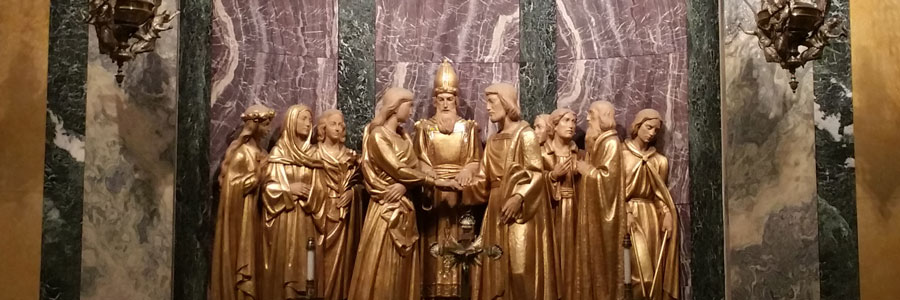A Relationship with Reality

One especially pressing question, these days, is how we can find meaning in a shut-down world. Shut off from others. Constrained in the unique experiences we can have. Perhaps struggling to make ends meet or keep alive that which we have labored to create — a business, an organization, a relationship.
That last is most on-point. One way or another, questions of meaning seem to come back to a relationship with God. Even those who disbelieve in the usual notions of a deity must find meaning in their relationship with reality. And what is a relationship? It’s an ongoing communication.
However one defines Him (or Her), we communicate with God through our interaction with His creation. This introduces the obvious challenge: Communication in a relationship must be two-way. We feel meaning when, in essence, the universe communicates with us.
The universe is so fundamental to our being, though, that it’s difficult to know whether God is communicating with us or the material universe just is and those things that seem meaningful are only coincidences or the sparks from our human minds finding patterns and weaving narratives. Often potentially meaningful events are contradicted shortly after they happen, and we have to rethink the communication to the point that it seems like no communication at all, or gibberish.
Yesterday’s meaningful experience told you to point your life in one direction, but today’s seems to be insisting on another. Even accounting for the implausibility of communicating with a Being whom we cannot comprehend, we can’t sense communication or find meaning when the messages might as well be random.
Then, when the messages aren’t random, we face the danger of mistaking messages from other sources than God. This would include the demonic, but also the materialist. We certainly feel as if we are receiving positive messages when something positive happens to us, like a promotion at work or a lottery win, but if we believe that these material wins are the only (or the most important) way God communicates with us, then meaning becomes bound up with our own success and the things it brings.
A second risk — more significant by far — is that we can forget the two-way nature of communication. When we chance to be materially successful, the important part is what we do with it. How we communicate back.
Complicating matters further for Christians is our certainty that God has told us that often we’re on the right track when the universe seems to be pushing back on us. When we are suffering. We see this in the crucifixion of Jesus and the persecution of saints. My God, why have you abandoned me? He hasn’t. Just as a pleasurable experience cannot necessarily be interpreted as a sign that you’re improving your relationship with God, so too a painful one is not necessarily a signal that your relationship is deteriorating.
In one of those happy “God winks” that feel, at least, like a communication, just as these thoughts were settling into my subconscious, I knelt for my daily Rosary and turned to the Joyful Mysteries. As with each series of Christian mysteries, they can be applied to different subjects, but this one seems directly relevant to the idea of communication.
In the first Joyful Mystery, an angel communicates with Mary about her pregnancy. That is, a spiritual being with a direct connection to God brings her a message from Him. Note how very private and personal the communication is. Calling this the Annunciation makes it sound like some major event — which it was, of course — but it happens quietly, in private. Saint Luke’s account makes no mention of a shaking Earth or beams of light or celestial music.
The Annunciation is merely a conversation, and one can imagine Mary subsequently wondering whether it had actually transpired. Just so do we wonder if the still, small voice was really there in a moment of prayer. Maybe you imagined it. Maybe you were tired and dozing unawares.
Next, in the Visitation, Mary and Elizabeth communicate with God through their recognition of each other. More profoundly, the recognition begins with the unborn child in Elizabeth’s womb, John, sensing the nearness of the unborn child in Mary’s, Jesus. Again, though, it’s a passing moment — a sensation while greeting each other.
And again, the third Joyful Mystery, the Nativity, is a quiet, humble affair. In the Christian understanding of history, here is one of its seminal events, and hardly anybody knows it’s happening. (The adjective is deliberately chosen, inasmuch as from an unseen seed grows an entire life and a lineage.) God draws in a few additional spectators through different communications — an annunciation to shepherds and a celestial sign to magi — but the profound moment is God’s communication by means of a gift given to Mary under Joseph’s care.
In due course, Mary and Joseph make their reply when, for the fourth Mystery, they present the baby Jesus to God at the temple. In the expanded view of the story, Simeon speaks directly to God upon seeing the baby, and Anna communicates God’s message to those awaiting the messiah.
An answer comes to my inquiry, however, when the Joyful Mysteries conclude with the Finding of Jesus in the Temple. In this moment, we see God communicating with the teachers as a teacher of them. Through Jesus, still a boy, God asks them questions, and they respond by thinking about His mysteries and trying to understand what He has created and, therefore, His nature.
Implicitly, when looking for patterns, we are are seeking communication from the pattern maker. How we respond to them is our reply. In having created, He has said, “You matter to me.” And in seeking, we are saying, “I want to understand you.”
Thus — with a deity who knows our intimate thoughts — it is merely our decision and our perspective that communicates and that draws out meaning. We make moments significant by conceiving of them as interactions. As when sitting with friends, we converse, to be sure, but even the silences can communicate. The crucial element is the bit of faith that it matters that we are in each other’s company, in a mutually meaningful way.


